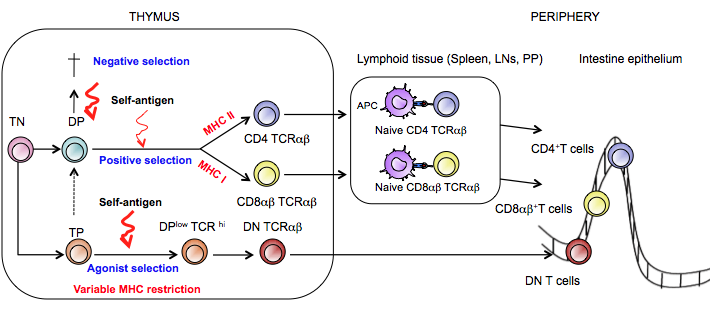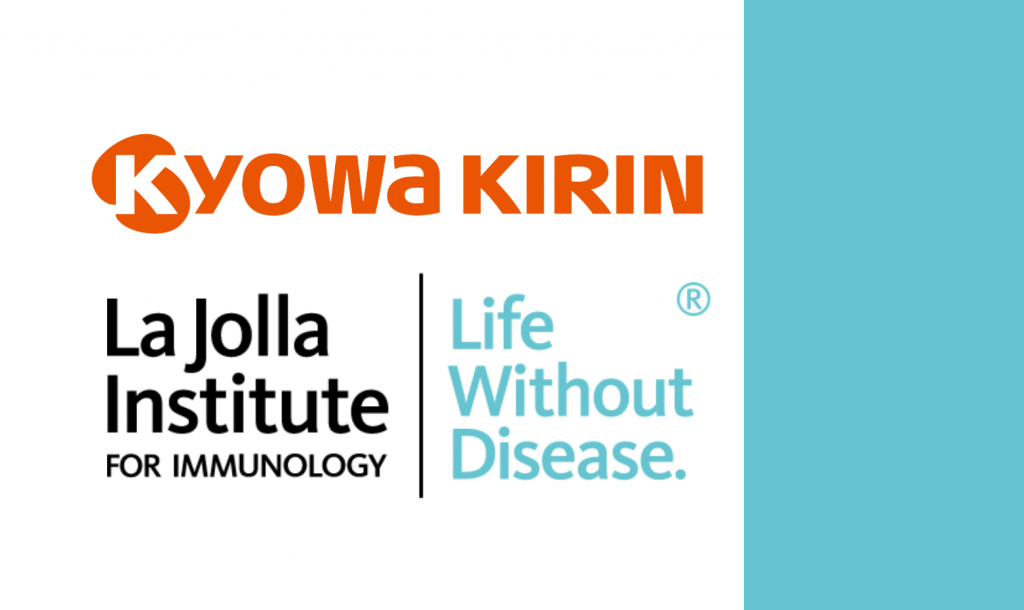One large subgroup of specialized T cells is encompassed by the intraepithelial T cells which are located in the epithelium of the small intestine in humans and mice. intraepithelial T cells are distinct from conventional T cells with regard to phenotype and function, with the great majority of the intraepithelial T cells being CD8+ cytotoxic T cells. Furthermore, in mice most of these CD8+ intraepithelial T cells exclusively express an αα homodimeric form of CD8 as opposed to the more typical CD8αβ heterodimer expressed by CD8+ splenocytes. The CD8αα+ intraepithelial T cells population characteristically contains numerous TCRgd+ T cells, CD4- CD8αβ- TCRαβ cells (also called double negative or DN TCRαβ intraepithelial T cells), and CD4+ CD8αα+ (or CD4 cytotoxic T cells) or CD8αβ+CD8αα+ intraepithelial T cells. CD8αα expression on T cells does not depend upon CD8β expression in the thymus. DN TCRαβ intraepithelial T cells do require β2m dependent MHC class I expression for their differentiation and/or homeostasis. They are, however, much less dependent on TAP expression and interestingly, these cells are present in mice that lack classical class I molecules (Kb and Db deficient mice). All mucosal T cells typically have an activated effector/memory phenotype. Furthermore intraepithelial T cells harbor numerous potentially autoreactive T cells, as evidenced by the presence of cells expressing forbidden Vβs reactive with autologous, retroviral-encoded superantigens. Conventional T cells are positively selected by weak interactions with self-peptides. By contrast, we have shown, using several transgenic systems in which a TCR transgene and an agonist for that TCR are co-expressed, that thymocytes expressing an autoreactive TCRαβ are positively selected in an a-CPM dependent way by the thymus and preferentially give rise to DN CD8αα expressing T cells in the gut. We have called this process “agonist selection” to distinguish it from conventional positive selection. In this last study, we have shown that the thymus derived class I or class II restricted agonist selected DN T cells are functional when exposed to antigen in vitro or in vivo. However, in normal mice chronic inflammation of the intestine due to the presence of numerous autoreactive T cells is not observed and the TCR/antigen transgenic mice do not show signs of autoimmune disorders. Agonist selected T cells are specialized self-specific T cells with regulatory functions.
Lab achievements:
– Agonist selection pathway:
We previously showed that high affinity (also known as agonist) interactions with thymic self-peptide-MHC complexes are key for their positive selection and functional maturation. Based on those findings we hypothetized that thymic precursors must have the ability to survive such high affinity interaction. Indeed, immature TP (DP thymocytes expressing CD8αα homodimer) but not DP thymocytes, are able to survive and differentiate to DN antigen-experienced cells in vitro whereas DP thymocytes die. This suggests that in vivo TP thymocytes might be the direct pre-selected precursors that transition to mature DN TCR thymocytes in response to agonist selection signals. Therefore, agonist selection promotes maturation of DN TCR+ T cells that exit the thymus as antigen-experienced T cells and have the capacity to migrate directly to peripheral tissues including the epithelium of the intestine (see figure). Finally, we recently developed a novel mouse model where mice are engineered to express TCRs isolated from naturally arising DN TCR+ intraepithelial T cells in the presence of natural endogenous self-antigens. The analysis of those mice showed that mature DN T cells are present in both in the spleen and the epithelium of the intestine, suggesting that the nature of the TCR and cognate self antigens imprints the commitment to the DN T cell lineage.
-MHC restriction:
Using multiple TCRs cloned from naturally arising DN T cells we showed that the MHC restriction of DN TCR+ intraepithelial T cells is variable. Indeed, some clones were restricted to classical MHC Ia (H2-K or H2-D), whereas other clones recognized non-classical 2m-dependent MHC Ib molecules. In addition, H2-K or -D restricted clones were TAP-independent whereas those recognizing MHC Ib molecules were either TAP-dependent or independent. Thus, the MHC restriction of DN TCR+ intraepithelial T cells is highly variable, a characteristic that distinguishes them from mainstream conventional selected CD8+ or CD4+ T cells and from other non-conventional T cell lineages such as iNKT or MAIT cells. This unusual MHC restriction pattern not only indicates that this is a unique T cell population but more importantly it suggests that these cells recognize antigens that cannot be sensed by other T cell subsets.
Significance:
In general our studies have led to a revision of the paradigm of thymic selection, requiring the addition of agonist selection along the conventional selection pathway as a mechanism to educate and select diverse subpopulations of specialized T cells. In addition, we recently showed that DN TCR+ T cells represent a non-redundant T cell population which have the ability to recognize a myriad of antigens presented by various MHC molecules and generated by different antigen presentation pathways that fail to engage conventional CD4 and CD8 T cells or any other T cell subset.
Selected References
Gapin, L., H. Cheroutre and M. Kronenberg (1999). “Cutting edge: TCR alpha beta+ CD8 alpha alpha+ T cells are found in intestinal intraepithelial lymphocytes of mice that lack classical MHC class I molecules.” J Immunol 163(8): 4100-4104.
Leishman, A. J., L. Gapin, M. Capone, E. Palmer, H. R. MacDonald, M. Kronenberg and H. Cheroutre (2002). “Precursors of functional MHC class I- or class II-restricted CD8alphaalpha(+) T cells are positively selected in the thymus by agonist self-peptides.” Immunity 16(3): 355-364.
Gangadharan, D., F. Lambolez, A. Attinger, Y. Wang-Zhu, B. A. Sullivan and H. Cheroutre (2006). “Identification of pre- and postselection TCRalphabeta+ intraepithelial lymphocyte precursors in the thymus.” Immunity 25(4): 631-641.
Leishman, A. J., L. Gapin, M. Capone, E. Palmer, H. R. MacDonald, M. Kronenberg and H. Cheroutre (2002). “Precursors of functional MHC class I- or class II-restricted CD8alphaalpha(+) T cells are positively selected in the thymus by agonist self-peptides.” Immunity 16(3): 355-364.
Mayans, S., D. Stepniak, S. F. Palida, A. Larange, J. Dreux, B. M. Arlian, R. Shinnakasu, M. Kronenberg, H. Cheroutre and F. Lambolez (2014). “alphabetaT cell receptors expressed by CD4(-)CD8alphabeta(-) intraepithelial T cells drive their fate into a unique lineage with unusual MHC reactivities.” Immunity 41(2): 207-218.





